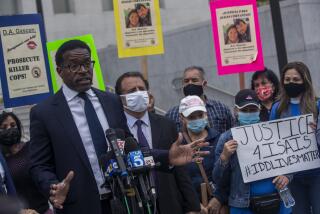A Worthy 1st Step
- Share via
Thank you, Sheriff Bob Brooks, for taking steps to better prepare Ventura County’s police departments to deal with the mentally ill.
The safety of officers, mental patients and bystanders alike depends on policies and training that do everything humanly possible to reduce the risks in these encounters.
Last month, Sheriff Brooks organized a meeting for his department, several police chiefs and mental health professionals to discuss the challenge. The action was prompted by a series of three incidents in a recent four-month period in which officers used deadly force on a person with a history of mental problems.
The meeting acknowledged that confrontations between mental patients and the police are inevitable--and they have increased as society has shifted toward housing the mentally ill in the community rather than in institutions.
How, Sheriff Brooks asked, can officers better respond to the mentally ill?
The officials discussed numerous ideas, including the creation of a crisis team. Departments would hire full-time psychologists and team them with officers, an arrangement already used by the Los Angeles police and sheriff’s departments. Currently, Ventura County’s police agencies contract with county psychiatric teams, which are on call for emergencies but sometimes can take too long to respond or may be tied up with their own patients.
Such a team would also be responsible for checking mentally ill people into the Ventura County Behavioral Health Center, which can take an hour or two of an officer’s time compared to the 15 minutes required to book a prisoner into the county jail. Some advocates for the mentally ill suggest that discrepancy is one reason so many people with mental health problems end up in jail. As many as 12% of jail inmates are considered mentally ill.
Authorities also called for more training for officers. Most new deputies are given about 10 hours of instruction concerning mental illness; experts urge ongoing training for all officers on the street. Toward that end, authorities have begun playing for officers a series of tapes produced by the Ventura County Alliance for the Mentally Ill, defining such conditions as bipolar disorder, depression and schizophrenia.
To fund such steps, the Sheriff’s Department hopes to take advantage of $27 million in new grants available to counties through the state Department of Corrections. The Mentally Ill Offender Crime Reduction Grants will fund programs assisting disturbed inmates caught up in the criminal justice system and help them to adjust on the outside.
Mental health advocates believe the long-term solution is more hospitals and more housing with 24-hour medical supervision. And authorities say the county badly needs a lock-down facility where officials can hold the mentally ill who commit crimes, instead of adding them to crowded jails.
Police work is stressful and risky under the best of circumstances, even more so when officers routinely must confront the unpredictable and try to reason with the irrational. It takes special skills, sensitivity and policies to protect mental patients from causing or suffering harm because of their illness. Ventura County’s law enforcement leadership is wisely moving in that direction.
“We’re not social workers, we’re not behavioral specialists,” Sheriff Brooks said. “But if we can get those people together, we can work with them to find a better solution in the long run.”
Efforts like the recent meeting and others planned for next year are worthy first steps.
More to Read
Sign up for Essential California
The most important California stories and recommendations in your inbox every morning.
You may occasionally receive promotional content from the Los Angeles Times.













